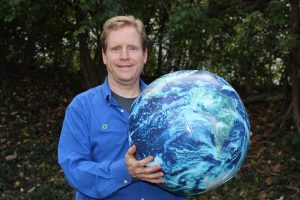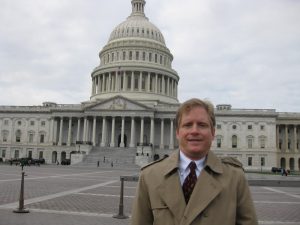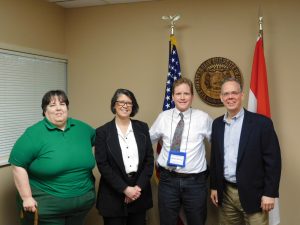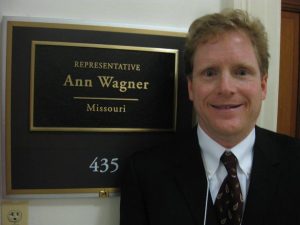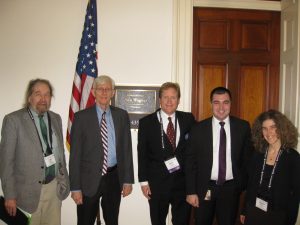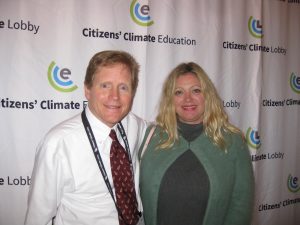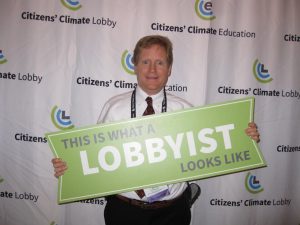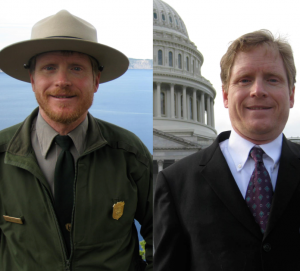
So many people think I have the perfect job as a park ranger. However, my perfect job would be a full time, year round climate change lobbyist and organizer.
For the past 25 years, I have worked as a summer seasonal park ranger at Crater Lake National Park Oregon. During that time, I also worked as a seasonal winter park ranger in Everglades National Park from 1992-2008. So many people I have encountered dream of becoming a park ranger. I don’t recall dreaming of being a park ranger as a child.
When growing up, I imagined myself becoming an author of science fiction novels, a lawyer, a missionary, making special effects for Star Wars movies, a TV newscaster, a comedian, a prophet (they always so wise and confident in the Bible or movies) , a movie actor, public speaker, truck driver (I loved to travel down highways, but my parents thought that would be a terrible idea. One day, they warned me that truckers get hemorrhoids. I am serious!l), President (I read many books on the Presidents as a child), tree surgeon (I always thought that job title sounded funny, but nobody laughed when I joked about wanting to be one) professional pool player (that’s billiards, meaning 8 ball or 9 ball. I spent so many hours in my parents’ basement as a kid practicing on their pool table to make that happen) or whatever crossed my mind at the moment.
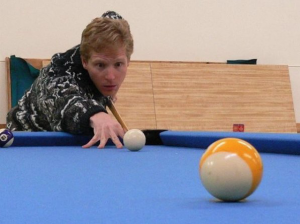
Brian Ettling shooting pool at Crater Lake Nat. Park 2005.
My serendipitous path to become a Park Ranger
In reality, I fell into working in the national parks for not knowing what else to do with my life. In 1992, I was completing my undergraduate degree in business administration from William Jewell College just outside of Kansas City, Missouri. I really liked my business and economics classes a lot, although my favorite college classes was acting and public speaking. While I was proud to earn this business degree, jobs were not exactly beaconing at my doorstep. Even more, I did not like the idea of just working in an office cubicle one bit. I wanted to be outside and a job where I can travel. On top of that, I really wanted to be away from Missouri. I always loved mountains and I really wanted to live in the Pacific Northwest, near its majestic mountains. Before graduating college, I secured a summer job working at the gift store at crater Lake National Park.
On the night of college graduation, I took an Amtrak train from Kansas City, MO to Klamath Falls, Oregon. When I arrived at southern Oregon and Crater Lake National Park, it was everything I dreamed of and more. It felt like I had found home and I did not want to leave. I loved the glistening snowcapped mountains, the jagged volcanic rocks on the mountains, the beautiful evergreen forests, and the bright blue waters of Crater Lake.
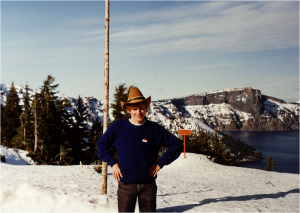
Brian Ettling at Crater Lake National Park in 1992.
Realistically, Crater Lake was a seasonal job, so I was going to have to find another job for the winter quickly. Unfortunately, the only offer I got was to work housekeeping in Everglades National Park for the winter. This was about as far away from the Pacific Northwest as I could be. A total bummer, but I needed a job and to be on my own away from St. Louis.
I enjoyed the winter of 1992-93 working in the Everglades with living along a beautiful marine shoreline, canoeing in mangroves to see alligators and crocodiles, etc. However, I could not wait to return to Crater Lake National Park that May to experience the climate and hike on the mountain trails. Naturalist John Muir said, “Going to the mountains is going home,”
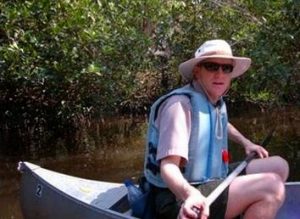
Brian Ettling at Everglades National Park around 2007.
I loved hiking in the park and the friends I made. I enjoyed my job working as a lead in the gift store, but I started to become intrigued to become a park ranger. I dated a woman at the time that jumped from working from the park concessionaire to becoming an entrance station fee collection ranger. She informed me the pay and the park housing is much better. I followed her to become a entrance station park ranger in 1996, and I loved wearing the uniform.
As I worked as a ranger, I got to know the interpretation/naturalist rangers who were leading the ranger programs. They awed me with their knowledge of nature and the park. All of them seemed to enjoy giving the ranger talks. I have always loved to talk and public speaking, so I really wanted one of those jobs. To get experience, I first became a naturalist guide ranger narrating the boat tours in Flamingo, Florida in 1998.
My determination to preach environmental protection as a park ranger
As a naturalist ranger, it was fun to show people the alligators, crocodiles, dolphins, manatees and birds on a daily basis. However, I absorbed as much as I could learning about the ecology of the Everglades and the restoration plan. I learned that the Everglades was one of the most endangered ecosystems on Earth. I wanted to do all I could to protect it and to stress as strongly as I could environmental protection and conservation during my ranger talks. I was as provocative as I could preaching about the Everglades restoration and protecting nature. I would conclude nearly all of my Everglades talks with this quote I loved by local Miami environmentalist Joe Podgor, “The Everglades is a test. If we pass it, we may get to keep the planet.”
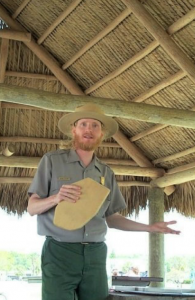
Brian Ettling giving a ranger talk at Everglades National Park 2004.
I could see the ecological damage to the Everglades with my own eyes with overdevelopment and urban sprawl shrank the Everglades in half. The cities took most of the water for drainage to keep the western suburbs dry. Therefore, there was not that much fish, birds, or other wildlife to see because the human interference in nature. It bothered me and I had no problem making visitors feel uncomfortable sharing my thoughts about it. At one point, I told Tim, a seasonal interpretation ranger in the Everglades, “I want to be an environmental activist.”
I will never forget Tim’s response: “You probably should not become a park ranger. You should just become an environmental activist.”
At the time, I felt uncomfortable with Tim’s advice. However, as time passed, I saw that Tim is correct. Rangers generally don’t sermonize with an environmental lecture. Rangers share knowledge, stories, and love of nature. Hopefully, that compelling information and passion inspires the audience to stewardship. As the etched wooden sign says in the interpretation workroom at Crater Lake National Park:
 If I could go back in time to chat with myself, I challenge myself to lighten up and be kinder to my audience. Thinking about this now, if young or older adult said to me, “I want to be a ranger,” my response might be: “Are you sure?”
If I could go back in time to chat with myself, I challenge myself to lighten up and be kinder to my audience. Thinking about this now, if young or older adult said to me, “I want to be a ranger,” my response might be: “Are you sure?”
I might press them exactly why do they want to be a ranger. I may encourage them to journal and really think about why do they want to become a ranger. Maybe, like me, they really want become an environmental activist. For the park visitors, the mission of the National Park Service, and their own career satisfaction, they may actually might be seeking something else.
I discovered my life’s passion for climate change as a park ranger
On the other hand, it was my naturalist job in the Everglades where I discovered my deep passion for climate change, especially how it impacts our national parks. Ironically, one of I the things I quickly learned when I started giving ranger talks is that people expect park rangers to know everything, don’t you?
In 1998, when I was giving ranger talks in Everglades National Park, Florida. Visitors started asking me about this global warming thing. Visitors hate when park rangers tell you, “I don’t know. ” As soon as I could, I rushed to the nearest Miami bookstore and library to read all I the scientific books I could find on climate change.
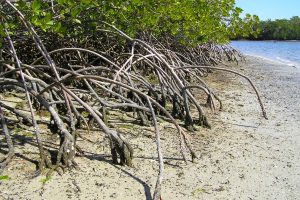
The mangrove coastline in Everglades National Park
I discovered sea level rise along our mangrove coastline in Everglades National Park. Sea level rose 8 inches in the 20th century, four times more than it had risen in previous centuries for the past three thousand years. Because of climate change, sea level is now expected to rise at least three feet in Everglades National Park by the end of the 21st century. The sea would swallow up most of the park and nearby Miami since the highest point of the park road less than three feet above sea level.
It really shocked me that crocodiles, alligators, and beautiful Flamingos I enjoyed seeing in the Everglades could all lose this ideal coastal habitat because of sea level rinse enhanced by climate change.
Even worse, I learned that sea level rise could be a disaster for the millions of people living in south Florida. In the last couple of years, the evidence is mounting for what is now called ‘sunny day flooding.’ This is flooding from ocean water showing up on Miami streets during the highest tides or what’s called ‘king tides’ of the year.
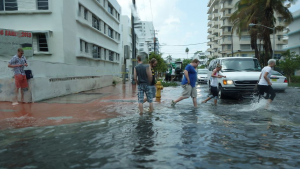
Sunny day flooding in Miami, FL. Photo Credit: Grist & dailykos.com
National Geographic now projects up to a 6 sea level rise by the end of this century that could displace up to 13 million Americans who live in these coastal counties.
Pursuing my passion on climate change as a private citizen advocate
I became so worried about climate change that I quit my winter job in Everglades National Park in 2008. Since then I spent my winters in hometown St. Louis to educate folks there about climate change. I created my own climate change talk that I shared with family and friends. I gave environmental talks to my nephew’s second grade class, his cub scout group, my younger niece’s girl scout group, and my older niece’s 7th grade class.
From March to May 2011, I had the amazing opportunity to work at the St. Louis Science Center at their temporary climate change exhibit, called Climate Change: The Threat to Life and a New Energy Future. It originated from the American Museum of Natural History in New York. I was in my glory working that job. The exhibit had profound text and displays to educate the public about the science, the problem and the solutions to climate change. My job was basically to keep the exhibits clean and engage the visitors. Whenever the exhibit was empty, which was early and late in the day, I would take precise notes on all of the information. I had fun engaging the pubic, especially the school groups, visiting the exhibit.
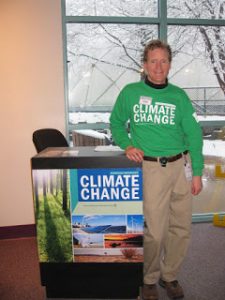
Brian Ettling at St. Louis Science Center Climate Change Exhibit 2011.
I went above and beyond with that opportunity, creating short presentations for children on the importance of Arctic sea ice for polar bears and us. In my spare time, I assisted middle school to high school teachers developing lesson plans for engaging their classes with the special climate change exhibit. My mother noted she had never seen anyone so happy going to work each day. Nor had I worked a job that was a better fit for me. I still proudly have my green uniform shirts from that job. With my deep interest in climate change, I still cannot believe how that job fell into my lap.
The benefits of pursuing my passion on climate change as a seasonal park ranger
From the St. Louis Science Center job, I gained the confidence to create an evening program on climate change at Crater Lake in August 2011. I still give that talk during the summers to this day. It is called The Good, the Bad, and the Ugly. For years, I read all I could about climate change in my spare time, but I was scared to talk about it as a ranger. It was partially because I did not feel like I knew enough. Even more, I was scared of visitors arguing with me about it.
I must say that my supervisor and lead interpretation ranger at Crater Lake knew my passion for climate change. They were encouraging my interest for years and they were very happy when I created climate change evening program at Crater Lake. The National Park Service has totally been supportive to my interest in climate change. Surprisingly, instead of being argumentative, the visitors so appreciative and receptive to my evening program.
Unlike my Everglades talks, I used more humor and an uplifting, fun message to inspire my audience to take action on climate change to protect our Crater Lake and our national parks.
Giving that climate change evening program has opened many doors for me. In November 2012, NASA invited me to give a talk on engaging park visitors on climate change at the National Association of Interpretation Convention in Hampton, Virginia. In May 2013, Grand Canyon National Park invited me to speak at their Shrine of the Ages Auditorium for an audience of over 200 park visitors and staff. In October 2013, Association of National Park Rangers invited me to speak at their annual convention about speaking to park visitors about climate change. In 2014, Oregon Wild invited me to speak on the impacts on climate change at Crater Lake at their annual conference in Portland, Oregon. In 2016, Citizens’ Climate Lobby Canada asked me give a talk at their Lobby Day Conference in Ottawa, Canada.
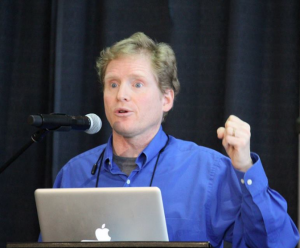
Brian Ettling speaking in Ottawa Canada November 2016.
In 2014, my supervisor assigned me to respond to an e-mail request from author Chris Santella, as he conducting research for his book 50 Places to Camp Before You Die. Chris wanted to feature a chapter on Crater Lake National Park. I called up Chris so he could interview me. We exchanged e-mails to nail down the information he needed on Crater Lake. The book was published and released in 2016 and the chapter on Crater Lake National Park featured me. It even included a brief biography at the end of the chapter:
“Brian Ettling has worked as a summer seasonal park ranger at Crater Lake National Park for the past twenty-two years…Since 2010, Brian spends his off-season trying to protect our national parks and natural world by teaching and public speaking on the problem of climate change and the things we can do to make this a healthier planet.”
To this day, that climate change Crater Lake ranger talk is still providing opportunities for me. In March 2017, I spoke to over a crowd of 100 people in Jefferson City, MO and a crowd of over 60 people in Kirksville, MO about the impact of climate change at Crater Lake. In 2017, the Metropolitan Learning Center grade school in Portland, Oregon invited me speak over 60 4th to 6th grader at their ClimateComm Conference on how I have seen climate change as a park ranger at Crater Lake. I am so blessed and proud to have my Crater Lake summer ranger job to be allowed to talk about climate change as often as I do.
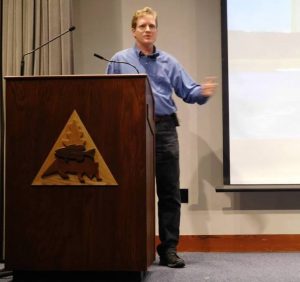
Brian Ettling speaking at Runge Nature Center, Jefferson City, MO. March 2017.
My victories and defeats struggling to be become a full time climate organizer
As much as I have loved working as a park ranger, especially with the freedom I had to give nearly weekly ranger talks on climate change, I had the dream for years to be a full time, year round climate change organizer, writer, and lobbyist. In 2011, I applied to follow the climate change exhibit that was at the St. Louis Science Center to the Cleveland Museum of Natural History, but they were not interested. I applied for a full time naturalist education job at the California Academy of Sciences in San Francisco in 2011, but they decided to hire internally. I applied twice in 2012 for an educator position with the Alliance for Climate Education (ACE), but they passed on hiring me.
I did briefly work as an organizer for the Missouri Sierra Club in St. Louis November 2013, but that job turned out to be just too relentless for me. I did not realize it when I accepted the job offer, but I signed an agreement for an “exempt position.” It was not just a 40 hours a week and go home. I was taking work home with me and it felt like I was working morning, noon, night, and weekends. I felt burned out after a month. The work involved organizing for the Beyond Coal Campaign and Sierra Club’s Energy Efficiency campaign. Great campaigns. I still believe in them to this day. However, the stress of constantly working, especially since I was giving other climate change talks on the side, was overwhelming. I really admire the great and dedicated people who work there, but it was not my cup of tea so I left after a month.
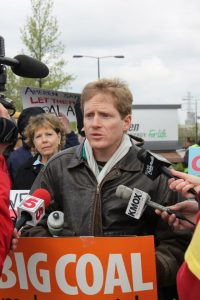
Brian Ettling speaking out against Ameren Utility’s reliance on dirty coal for electricity in St. Louis, MO. April 2013.
In 2015, I applied for an Engagement Coordinator position with the Climate Reality Project. I was first trained as a Climate Reality Leader in 2012. I really love my volunteer involvement with that organization, and I would love to work for them. However, it was crushing to hear they decided to hire someone with more organizing experience. That news was a real downer. More recently in 2017, I applied for the Climate Communications & Outreach Manager position with the Oregon Environment Council in Portland, Oregon. A month ago, I got the e-mail with the message that they appreciated me applying, but they did not select my application for an interview.
I volunteered as much as I could for the past 5 years for Citizens Climate Lobby and Climate Reality Project. I created goofy comedy climate change YouTube videos to get noticed. Well, I did get noticed. Comedy Central’s Tosh.o flew me out to Los Angeles to be filmed on their show. It was an incredible experience. I am so proud of appearing on that show, but Hollywood has not called back since then.
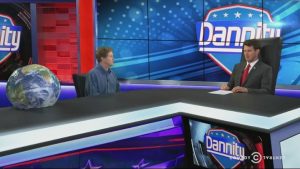
Brian Ettling appearing with TV host & comedian Daniel Tosh, on his TV show Tosh.o on August 2, 2016
In January 2011, I joined my local St. Louis Toastmaster group, South County Toastmasters. Over the past 6 years, I gave 20 speeches, 8 of which I was voted by my fellow Toastmasters as “Best Speaker.” I put most of those speeches on YouTube and blogged about them, hoping someone would spot me. In 2011, I created this blog and website climatechangecomedian.com, trying to get noticed.
In August 2011, a mutual friend introduced me to Tom Smerling, the founder of the website, climatebites.org, which specialized in collecting soundbites to communicate about climate change. Until the website started deteriorating due to technical support neglect and repeated hackings, I contributed over 200 writings to the site. However, that website did not get the traffic that Tom wanted and it did not get me noticed either. I loved contributing to that website. It really helped advance me as a climate change public speaker and communicator.
In October 2011, Larry Lazar and I co-founded the Climate Reality St. Louis Meet Up group. Over the past 6 years, we organized various climate change meet up events in the St. Louis area with various well-known climate change scientists and communicators speaking to us via Skype. The last event I hosted in January 2017 attracted over 80 people. They came to see one of the top climate volunteer lobbyists in the U.S, Jay Butera, recently featured in the New York Times, speak to us via Skype.
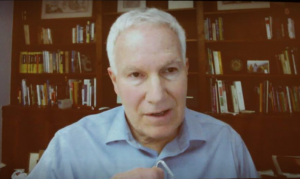
Citizens’ Climate Lobby volunteer speaking to the St. Louis Climate Reality Meet Up. January 2017.
As a climate change volunteer advocate, organizer, writer and volunteer, my proudest achievements include getting published in Yale Climate Communications in April 2012, newspapers publishing 18 of my opinion editorial or guest opinion submissions over the past four years, organizing various climate change events in St. Louis and elsewhere, and giving over 100 climate change talks. I take deep pride knowing I inspired others to write op-eds in the newspapers, lobby their members of Congress, attend Citizens’ Climate Lobby Conferences in Washington D.C and Climate Reality Trainings. It feels like I made difference just co-founding the southern Oregon Citizens’ Climate Lobby group in 2013 that meets monthly and is going strong to this day.
So many other exciting events I could list. On April 15, 2014, the local St. Louis NPR radio program St. Louis On the Air interviewed my friends Larry Lazar, Dr. Jack Fishman, and I about communicating about climate change. In November 2015, the lead St. Louis organizer from Avaaz chose me on the spot to be the main speaker for that People’s Climate March. I spoke briefly to over 100 people on a chilly and rainy November day in downtown St. Louis. The weather was dreary, but the crowd seemed to love my brief remarks.
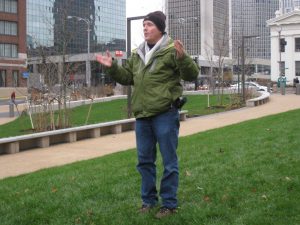
An impromptu motivational speech at a Climate Change march in downtown St. Louis.
It is still my goal and dream to be a full time year round climate organizer and lobbyist
Organizing, writing, lobbying, and speaking on climate change is what I love doing more than anything. I just would love to find a way to get paid doing that. It has been a huge letdown and depressing that it has not worked out yet. My wife Tanya and I are working on the idea of me setting up a website, donations, and a 501c4 non-profit called Climate Solutions Lobbyist so I can raise funds from family, friends, and donors to exclusively lobby and organize on climate change. This is uncharted territory for Tanya and I to try to figure out how to do this. I did have some friends say they would contribute if I did set something up.
Unfortunately, I had a recent conversation on Skype with one of the top advocacy organizers in the U.S. He advised me against setting up my own non-profit. He did not think what I wanted to do was that distinguishable or unique from what others are doing. He discouraged me from pursuing that idea. By the end of our conversation, I just felt discouraged and hopeless.
Does anyone out there have any suggestions or thoughts?
Hello! Is there anyone out there that reads my blog?
I sure could use some advice, mentoring, coaching, and help.
In the meantime, I had a chance to return to Crater Lake National Park to work again this year as an interpretation ranger. The park was very short staff in May and could really use my help. With my life’s goal to still be a full time, year round climate change organizer and lobbyist, I told my Crater Lake supervisor that I would just work the month of May. She could really use my help that time of year so she reality said yes. I am not the best of marketing and promoting myself for potential jobs and starting my own organization. However, I do want to go where I feel most useful and beneficial to others in my life so I decided to return to work as a ranger here for one month.
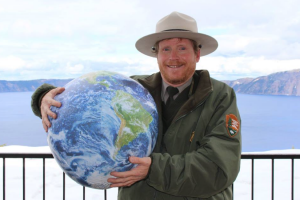
Brian Ettling at Crater Lake National Park. May 2016.
I made June 8th as my last day because I plan to attend the Citizens’ Climate Lobby Conference and Lobby Day in Washington D.C. June 11-13th and the next Climate Reality Training in Bellevue Washington June 27-29th. Plus, I wanted to spend more time with my wife in Portland. The long distance from Tanya is very hard. Portland to Crater Lake is about a 5 hour drive. On top of that, I really just want to organize and lobby full time on climate change.
As soon as I returned to Crater Lake, it did feel good to have a steady job and receive a reliable paycheck. Tanya and I moved to Portland in March when she found a permanent job there. Our rent and the cost of living is not cheap in Portland, so it is vital for me to bring in a steady income. I saw that our department is short staffed for the summer and they can still really use me here. Plus, I still can give my climate change evening program about once a week during the summer. Even more, some teachers and friends wanted to come to Crater Lake this summer just to see my climate change talks. Much to my wife’s chagrin, Crater Lake is pulling me back to work here for the summer.
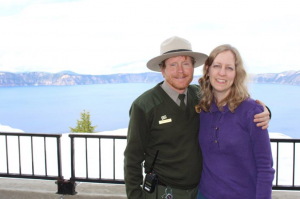
Therefore, I decided to return to work here July 10th to roughly September 15th. It was a tough decision, but it felt right. My supervisor and other park staff was so happy I am returning for the summer. That made me feel good. As I shared in my previous blog, I have felt so much discouragement at times with my involvement within the climate movement. It seems like some people don’t want me around. They don’t see me as beneficial, don’t want to partner with me, mentor me, encourage me, assist me, or even welcome me.
I love the slogan from the recent climate marches: “To change everything we need everyone.”
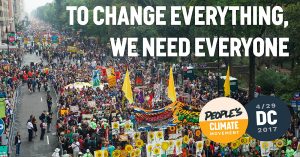
Photo credit: peoplesclimate.org
Yet, I have not always felt like part of the club. I am still going to charm, help others, be audacious, work hard, and inspire to get well connected, but it has been hard for me to break into the well connected climate organizing inner circle.
I love the anonymous quote: “Be outrageous. It is the only place that it not crowded.”
I am still following my climate change calling. I hope you follow your life’s calling!
I will succeed as a full time, year round climate change organizer and lobbyist. I am not going to be deterred by this, even if there are days when I feel like giving up. I spent so much of my life working on this. It is what I have enjoyed doing more than anything. The victories have been so sweet, even while the setbacks have been so heart breaking. Even more than being a park ranger, I want to be remembered as a climate change public speaker, writer, organizer and lobbyist.
I am very proud to be a park ranger for the past 25 years. I have been so blessed and fortunate to be a park ranger. It really gave me the freedom and creativity to pursue my passion with climate change. I still love putting on the uniform, but it is not want I want to do for the rest of my life. Before I really understood that I wanted to be a climate change organizer and lobbyist, I knew I wanted to be an environmental activist and change agent. It is still important for me to follow this calling, even if this transition is quite a struggle for me.
Mark Twain once said, “Always do right. This will gratify some people and astonish the rest.”
As William Shakespeare wrote in Hamlet,
“This above all: to thine own self be true
And it must follow, as the night the day
Thou canst not then be false to any man/Farewell, my blessing season this in thee!”
I still think it is vital for my life and yours to adhere to mythologist Joseph Campbell’s advice to “Follow Your Bliss!’
Do follow your one true calling, whatever it is. If you don’t know what your true calling is, that’s no problem. I could sure use your help and support as I struggle to transition from a seasonal park ranger to a full time, year round climate change organizer and lobbyist.
P.S: I want to thank my parents, in-laws, and most of all, my wife Tanya how supportive they have been as I have pursued my life’s journey and calling so far.
